by Jodie T. Allen. Senior Editor, Pew Research Center and Kathleen Holzwart, Research Analyst, Pew Global Attitudes Project
With international financial markets in turmoil, it was not surprising that the selection of Taro Aso as the new leader of Japan’s long-time ruling party played out against a backdrop of national apprehensiveness and pessimism. Yet even if international financial markets had not been in turmoil, it would have been surprising if Monday’s selection had been framed by anything other than a backdrop of national apprehensiveness and pessimism.
The country’s most recent prime minister, Yasuo Fukada, resigned after less than a year, driven from office by rock-bottom approval ratings as was his similarly short-termed predecessor, Shinzo Abe. Now the Liberal Democratic Party, which has ruled Japan almost continuously since its creation in 1955, is hoping that its next choice of a prime minister will recapture the popularity enjoyed by Junichiro Koizumi, the popular LDP leader widely credited with reinvigorating Japan’s economy after he took office in 2001.
And, indeed, Japan’s economy has performed quite impressively in recent years. While China’s fast growth has captured the headlines, Japan’s people continue to enjoy a world-class standard of living. Its Gross Domestic Product is topped only by that of the United States and while the U.S. runs a mammoth deficit (upward of $700 billion a year) in its account balance with the rest of the world, Japan continues to run a hefty surplus, topped last year only by China and Germany.
Moreover, as the Economist magazine recently observed, while America’s average GDP growth over the last five years outpaced Japan’s (2.9% vs. 2.1%), thanks to its low birth and immigration rates, Japan’s GDP per capita has outpaced that of both the U.S. and Germany. As the Economist notes, “contrary to the popular pessimism about Japan’s economy, it has actually enjoyed the biggest gain in average income among the big three rich economies.”1
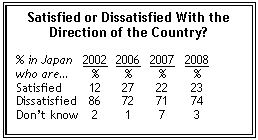 Judging from the findings of the Pew Research Center’s Global Attitudes Project, however, the country’s relative prosperity has not been reflected in the perceptions of its people. For example, while satisfaction with the direction in which their country is headed has risen from a rock bottom 12% since 2002, fewer than one-in-four (23%) among the Japanese public said they were satisfied with the country’s direction in last spring’s survey. And while dissatisfaction with their country’s direction has risen in some other developed countries, in the 2008 poll only in the U.S. (70%) and France (71%) did levels approach the 74% recorded in Japan.
Judging from the findings of the Pew Research Center’s Global Attitudes Project, however, the country’s relative prosperity has not been reflected in the perceptions of its people. For example, while satisfaction with the direction in which their country is headed has risen from a rock bottom 12% since 2002, fewer than one-in-four (23%) among the Japanese public said they were satisfied with the country’s direction in last spring’s survey. And while dissatisfaction with their country’s direction has risen in some other developed countries, in the 2008 poll only in the U.S. (70%) and France (71%) did levels approach the 74% recorded in Japan.
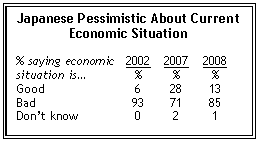 While views of their own economies had also darkened in other developed countries by last spring (77% of Americans rated the U.S. economic outlook bad, though only 46% of Germans, and only 28% of Australians, were of like mind), Japanese economic pessimism has tended to outpace that in other well-heeled nations. Fully 85% among the Japanese public described their country’s current economic situation as somewhat or very bad; a mere 13% judged it even somewhat good.
While views of their own economies had also darkened in other developed countries by last spring (77% of Americans rated the U.S. economic outlook bad, though only 46% of Germans, and only 28% of Australians, were of like mind), Japanese economic pessimism has tended to outpace that in other well-heeled nations. Fully 85% among the Japanese public described their country’s current economic situation as somewhat or very bad; a mere 13% judged it even somewhat good.
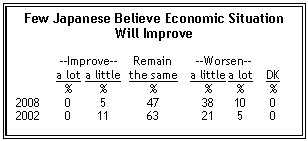 To the Japanese, the prospect ahead appears still bleaker. Nearly half (48%) see tougher times in the coming year while a tiny 5% see the likelihood of small economic gains. The number seeing major improvement: zero. Even in chronically gloomy France about one in five (19%) see better times on the horizon. And in China a huge 85%-majority sees further economic gains in the offing.
To the Japanese, the prospect ahead appears still bleaker. Nearly half (48%) see tougher times in the coming year while a tiny 5% see the likelihood of small economic gains. The number seeing major improvement: zero. Even in chronically gloomy France about one in five (19%) see better times on the horizon. And in China a huge 85%-majority sees further economic gains in the offing.
It may seem unsurprising that countries such as China and India that have experienced unprecedented growth in recent years should anticipate further economic progress. But per capita incomes in these countries still lag very far behind those enjoyed in Japan. So that country’s prevailing pessimism may come into sharpest focus in the Japanese people’s views of their personal economic situation.
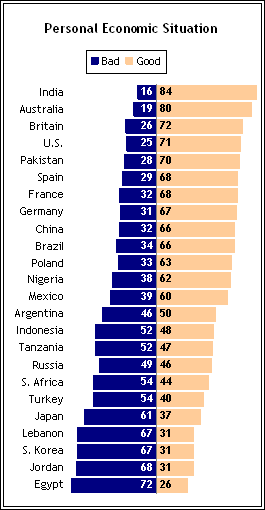 Despite their world-beating per capita affluence, a mere 36% among the Japanese public rate their own finances as even “somewhat good,” while a miniscule 1% judge the state of their pocket book as “very good.”
Despite their world-beating per capita affluence, a mere 36% among the Japanese public rate their own finances as even “somewhat good,” while a miniscule 1% judge the state of their pocket book as “very good.”
On the “bad” side of the ledger, nearly half (48%) select “somewhat,” while 13% say “very.” Contrast this with the 84% of Indians and 66% of Chinese and Brazilians who, despite their relative impoverishment, nonetheless express at least some degree of satisfaction with their economic lot in life.
On the foreign policy front, however, Japan’s views do not stand out in sharp contrast with those of many other industrialized countries. Asked if they thought of China more as a partner or enemy of Japan, a 55%-majority said neither, while roughly equal numbers chose partner (20%) or enemy (23%). The U.S. public is split along similar lines, with 13% seeing China as more of a partner, 20% opting for more of an enemy and 62% choosing neither. Australians are more likely to view China as a mate (32%) while only 3% see it as a hostile nation, but again the majority (62%) opt for neither.
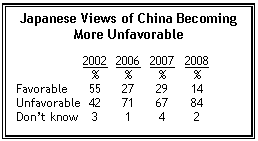 Still it seems clear that Japanese views of China are hardening as the latter becomes a stronger economic and perhaps even military competitor. In this year’s survey a heavy 84%-majority expressed either a somewhat (50%) or very (34%) negative view of China, while only 13% took a somewhat favorable view and a mere 1% expressed a very favorable judgment. Six years earlier, a 55% majority of Japanese looked kindly upon the Middle Kingdom. Attitudes toward South Korea, while not unmixed, are far more positive on balance, with 57% of Japanese expressing a favorable and 40% an unfavorable view.
Still it seems clear that Japanese views of China are hardening as the latter becomes a stronger economic and perhaps even military competitor. In this year’s survey a heavy 84%-majority expressed either a somewhat (50%) or very (34%) negative view of China, while only 13% took a somewhat favorable view and a mere 1% expressed a very favorable judgment. Six years earlier, a 55% majority of Japanese looked kindly upon the Middle Kingdom. Attitudes toward South Korea, while not unmixed, are far more positive on balance, with 57% of Japanese expressing a favorable and 40% an unfavorable view.
Figure
And while a solid majority (58%) among Japanese continues to oppose amending the country’s constitution to allow Japan to declare war and maintain a military, that number has declined from 67% as recently as two years ago.


